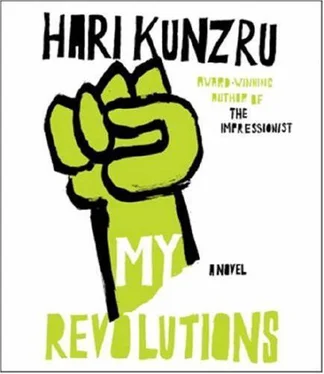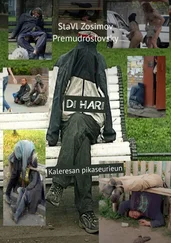So we drove through France and for a few days, as I’d hoped, Bountessence receded from our lives. We were just ourselves again, two people who had the capability to make each other happy. We avoided the highways and made our way south on Routes Nation-ales, Miranda overtaking trucks on long straight roads lined with cypress trees, me humming along to a tape of Charles Trenet chansons , wishing I understood more of the words to the one about being happy and in love on Nationale 7. We stopped overnight at a hotel in a forgettable small town where we ate Coquilles Saint-Jacques and slept in a room papered with an alarming pink rose pattern, which had migrated like a fungus to cover not just the walls but the ceiling and the panels of the wardrobe and the bathroom door. We had sex in the soft, lumpy bed, giggling like children
as the iron frame creaked and the headboard banged against the wall. Our neighbor retaliated by turning on the TV and we fell asleep to the muffled sound of gunfire. In the morning we woke up and dragged our cases out of the rose room and back into the car, silent and hung over. I put on the Charles Trenet and Miranda switched it off again. Eventually we arrived.
The place I’d booked was described as an ancient stone house on the outskirts of a tranquil village near Béziers. It turned out to be a cramped little maisonette, with the rough white textured plaster, dubious wiring, and mismatched crockery of holiday apartments all over Europe. Miranda went out to buy flowers, and I opened the shutters and was hit by clean white southern light. We decided to be happy.
Our idyll lasted four days — days of waking up to the noise of the village street under our balcony, of chopping tomatoes, speaking bad French in shops, driving to the river, sopping honey onto fresh bread and drinking little bottles of beer that accumulated in a green gang by the side of the loudly humming fridge. We visited markets, Miranda pointing winsomely at produce she packed into a wicker basket as I picked through a phrasebook, vainly searching for the names of fish and vegetables. I followed her around contentedly, enjoying the way her thin cotton dress silhouetted her legs.
Miranda liked to take a siesta. She wanted, she said, to live to a Mediterranean rhythm, at least for a couple of weeks. I’d brought a fat book with me, a thriller I couldn’t get into, and as she snoozed in the heat of the afternoon, I lay beside her on the bed with it balanced on my chest, my eyes skating off the print as I cycled through a familiar sequence of thoughts. How circumscribed my life was, how regulated. How — I hesitated to use the word trapped , even to myself, but then again I was with Miranda Martin, who’d been one of those little girls who get to the age of ten with every detail of their wedding day prearranged in their heads, who retained the ability to make a plan and then slot the world into it, like a peg into a board. That was certainly how it had been with us. She had a vacancy; I was interviewed; I got the job. As usual when my
mind worked in this fashion, I resolved nothing, just ran through my list of complaints like a man turning the wheel on some rusty piece of agricultural machinery.
On the fourth afternoon I finally fell asleep beside her, and woke up refreshed, comforted. I suggested we spend the afternoon at a village I’d been reading about in the Green Guide . Sainte-Anne-de-la-Garrigue was an hour’s drive away. It was a place with a bloody history, the site of a siege during the Albigensian crusade, after which its Cathar defenders had been burned at the stake. The Michelin people gave it two stars.
We packed hats and bottled water and turned the air-conditioning up high to dispel the awful heat in the car. Though it was late afternoon when we crossed it, the sun was still beating down like a drummer on the narrow stone bridge over the river. We drove on through a paper-flat world of white limestone, yellow-green scrub, and cloudless blue sky as the road picked its way up the side of a gorge, passing through a pinewood to emerge into gorse and thistle and a series of hairpin bends whose vertiginous drops were punctuated on the worst corners by white-painted rocks and battered metal barriers.
As we passed over the col I caught sight of Sainte-Anne, a spiral of red-roofed stone houses knotted tightly round a jutting white rock. When we got closer I saw that on top of the rock was a stark broken rectangle, the stump of a tower, which the guidebook informed me was “of uncertain age.” We parked outside a church in a little square, completely without shade. The village appeared deserted; the heat had driven everyone inside. The only place that seemed to be open was a café, the generically named Bar des Sports. We sat down at a table under an umbrella and drank little round-bellied bottles of Orangina, trying to work up the energy for sightseeing.
“It’s pretty,” said Miranda, a note of approval in her voice.
“You sound like a teacher giving out marks.”
She frowned. I’d meant it as a joke. Sainte-Anne-de-la-Garrigue was undeniably pretty. There was a little mairie and a war memorial,
and behind the church a narrow cobbled street that wound upward in the direction of the tower.
“That was where they executed the heretics after the siege,” I told her. “Over there. Right in front of the church door.”
“Mike?”
“Yes?”
“Put the guidebook away.”
“But that’s the whole point of this place.”
“What is?”
“What happened here.”
“Why should I care what happened here? Nothing has happened to me here. It’s just a pretty little village on a very hot day.” “But—”
“Mike, I want to feel peaceful, not think about people being burned at the stake.”
So we sat in silence. Miranda took a picture of me and I smiled distractedly. There was something occulted about Sainte-Anne, something I wanted to decipher. The mid-afternoon quiet had a physical quality, an apparent potential for form and weight.
“Do you want to climb up to the tower?” I asked.
“Not yet. Give it ten minutes. Let’s have another drink.”
We ordered mineral water, and I sat and listened to the tiny fizz in my glass as it mingled with other tiny sounds: insects, a transistor radio muttering in the back room of the bar. I watched an old man cross in front of the church, leaning heavily on a walking stick. He was dressed in some kind of long robe; I wondered if he was the curé . Then something peculiar happened. I could put it down to the heat, I suppose. Perhaps I fell asleep for a few seconds, enough time for the old man to round the corner and a second person to appear in the same spot. However it happened, I suddenly realized the person I’d taken for an old man was actually a woman. There was no robe, no stick, nothing even to suggest them. The transition was seamless: one minute one figure, the next another. This woman was tall, wearing pedal pushers and a sleeveless cotton top that revealed a pair of wiry, muscular shoulders. Shadowing her
face was a big straw hat. She carried a string bag filled with fruit: oranges, peaches, a green-skinned melon. Though she was a long distance away, I sensed something familiar about her. Maybe it was her walk, an unhurried but somehow purposeful amble, one brown arm swinging the bag, the other raised occasionally toward her hidden face. Smoking a cigarette. Who used to walk that way? Who used to walk along smoking, swinging a bag?
The woman didn’t look like a villager. A tourist? I thought not; at least, not a day-tripper. She looked too purposeful. From such a distance it was impossible to say how old she was. She turned the corner into the street that led up to the tower.
“Come on,” I said to Miranda. “Drink up. Time for some exercise.”
Читать дальше












